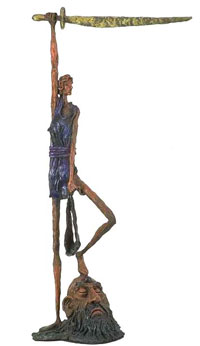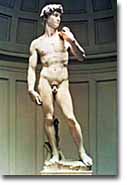
This Sunday we have the vivid story of David and Goliath, continuing the theme that God often surprises us by using the small, the overlooked or underused to do big work on the earth. It's an interesting text to contemplate the week after our church has elected the first woman as Presiding Bishop in the Anglican Communion.
Sculpture by Phillip Ratner1 Samuel 17: 32-49David said to Saul, "Let no one's heart fail because of him; your servant will go and fight with this Philistine." Saul said to David, "You are not able to go against this Philistine to fight with him; for you are just a boy, and he has been a warrior from his youth." But David said to Saul, "Your servant used to keep sheep for his father; and whenever a lion or a bear came, and took a lamb from the flock, I went after it and struck it down, rescuing the lamb from its mouth; and if it turned against me, I would catch it by the jaw, strike it down, and kill it. Your servant has killed both lions and bears; and this uncircumcised Philistine shall be like one of them, since he has defied the armies of the living God." David said, "The LORD, who saved me from the paw of the lion and from the paw of the bear, will save me from the hand of this Philistine." So Saul said to David, "Go, and may the LORD be with you!" Saul clothed David with his armor; he put a bronze helmet on his head and clothed him with a coat of mail. David strapped Saul's sword over the armor, and he tried in vain to walk, for he was not used to them. Then David said to Saul, "I cannot walk with these; for I am not used to them." So David removed them. Then he took his staff in his hand, and chose five smooth stones from the wadi, and put them in his shepherd's bag, in the pouch; his sling was in his hand, and he drew near to the Philistine.
The Philistine came on and drew near to David, with his shield-bearer in front of him. When the Philistine looked and saw David, he disdained him, for he was only a youth, ruddy and handsome in appearance. The Philistine said to David, "Am I a dog, that you come to me with sticks?" And the Philistine cursed David by his gods. The Philistine said to David, "Come to me, and I will give your flesh to the birds of the air and to the wild animals of the field." But David said to the Philistine, "You come to me with sword and spear and javelin; but I come to you in the name of the LORD of hosts, the God of the armies of Israel, whom you have defied. This very day the LORD will deliver you into my hand, and I will strike you down and cut off your head; and I will give the dead bodies of the Philistine army this very day to the birds of the air and to the wild animals of the earth, so that all the earth may know that there is a God in Israel, and that all this assembly may know that the LORD does not save by sword and spear; for the battle is the LORD's and he will give you into our hand."
When the Philistine drew nearer to meet David, David ran quickly toward the battle line to meet the Philistine. David put his hand in his bag, took out a stone, slung it, and struck the Philistine on his forehead; the stone sank into his forehead, and he fell face down on the ground.
 After Saul's death there was a bitter civil war among the tribes of Israel. The king was dead, but the remnants of his army opposed David. The following passage records the reconciliation between the two armies and the begining of David's reign in Jerusalem.
After Saul's death there was a bitter civil war among the tribes of Israel. The king was dead, but the remnants of his army opposed David. The following passage records the reconciliation between the two armies and the begining of David's reign in Jerusalem.


